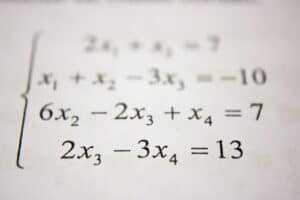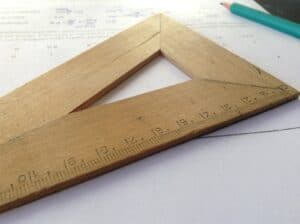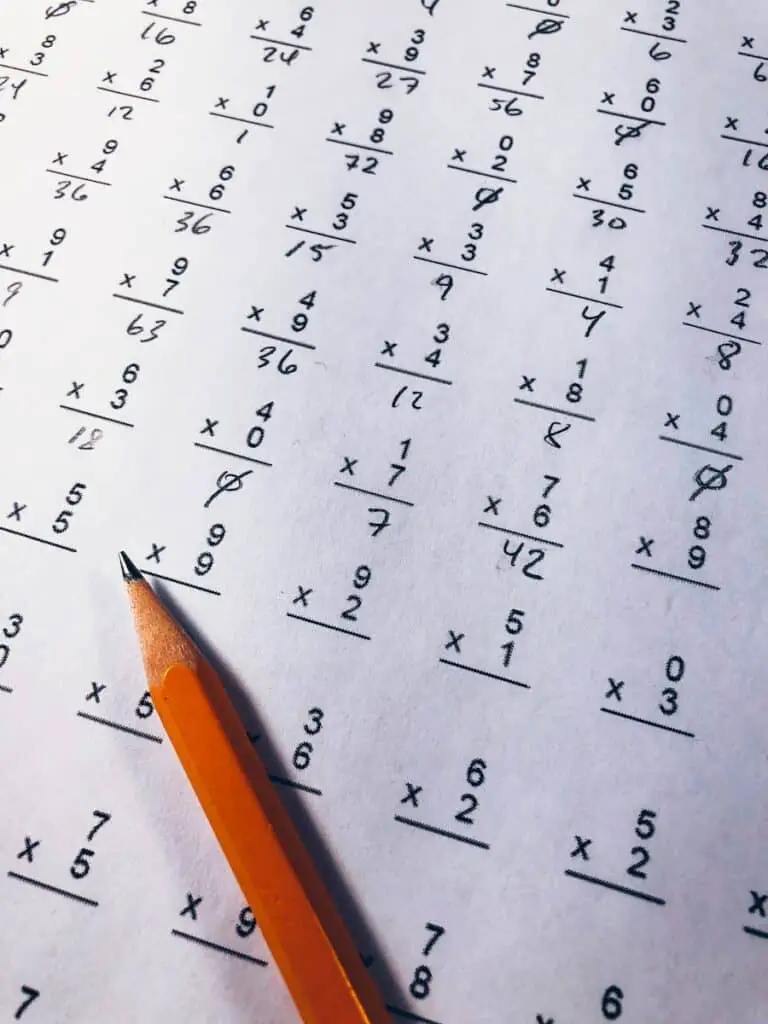The math section of the GED test can be a significant hurdle for many individuals, evoking questions like “What math is on the GED test?” For those aiming to achieve their high school equivalency, a clear understanding of the mathematical concepts covered in the GED exam is essential. In this guide, we will delve into the specifics of the math content featured in the GED test, providing you with insights into the various topics, skills, and problem-solving abilities that are evaluated. By demystifying the math portion of the GED test, we aim to equip you with the knowledge and confidence needed to tackle this section and move closer to realizing your educational goals.
What Math is on The GED Test?
The GED test includes a math section that assesses an individual’s mathematical knowledge and skills. The math section of the GED test is divided into two parts: calculator-permitted and calculator-not-permitted. The calculator-permitted portion of the test lasts for 45 minutes and the calculator-not-permitted portion of the test lasts for 55 minutes.

The math section of the GED test covers a wide range of mathematical concepts and skills, including mathematical operations and algebra, geometry and measurement, and data analysis, statistics, and probability. The test questions will be a mix of multiple-choice and fill-in-the-blank problems, as well as some drag-and-drop and hot-spot questions.
It’s important to note that the math section of the GED test does not require advanced math concepts like trigonometry or calculus. However, it does require a solid understanding of basic mathematical concepts and the ability to apply them to solve problems.
Mathematical Operations and Algebra on the GED Test
The math section of the GED test includes questions that assess an individual’s understanding of mathematical operations and algebra. These concepts include:
- Basic mathematical operations: The test will include questions that assess an individual’s ability to perform basic mathematical operations such as addition, subtraction, multiplication, and division.
- Fractions: The test will include questions that assess an individual’s understanding of fractions, including simplifying fractions, adding and subtracting fractions, and multiplying and dividing fractions.
- Decimals: The test will include questions that assess an individual’s understanding of decimals, including adding, subtracting, multiplying and dividing decimals.
- Percents: The test will include questions that assess an individual’s understanding of percents, including converting between fractions, decimals, and percents, and solving problems involving percents.
- Algebra: The test will include questions that assess an individual’s understanding of algebraic concepts such as solving equations and inequalities, graphing linear equations, and understanding slopes.
It’s important to note that the GED test does not require advanced algebraic concepts like quadratic equations or polynomials. However, it does require a solid understanding of basic algebraic concepts and the ability to apply them to solve problems.
Geometry and Measurement on the GED Test
The math section of the GED test includes questions that assess an individual’s understanding of geometry and measurement concepts. These concepts include:
- Basic geometric shapes: The test will include questions that assess an individual’s understanding of basic geometric shapes such as points, lines, angles, and planes.

What Math is on The GED Test - Perimeter, area, and volume: The test will include questions that assess an individual’s understanding of how to calculate the perimeter, area, and volume of geometric shapes.
- Measurement: The test will include questions that assess an individual’s understanding of measurement concepts, including unit conversions and measurement estimation.
- Pythagorean theorem: The test will include questions that assess an individual’s understanding of the Pythagorean theorem and its applications.
- Coordinate geometry: The test will include questions that assess an individual’s understanding of coordinate geometry, such as plotting points on a coordinate plane and understanding slope.
It’s important to note that the GED test does not require advanced geometric concepts like calculus or trigonometry. However, it does require a solid understanding of basic geometric concepts and the ability to apply them to solve problems.
Data Analysis, Statistics, and Probability on the GED Test
The math section of the GED test includes questions that assess an individual’s understanding of data analysis, statistics, and probability. These concepts include:
- Data interpretation: The test will include questions that assess an individual’s ability to interpret data presented in tables, graphs, and charts.
- Mean, median, and mode: The test will include questions that assess an individual’s understanding of how to calculate measures of central tendency such as mean, median, and mode.
- Range and standard deviation: The test will include questions that assess an individual’s understanding of how to calculate measures of variability such as range and standard deviation.
- Probability: The test will include questions that assess an individual’s understanding of probability concepts, including independent and dependent events, probability distributions, and expected values.
- Counting and combinatorics: The test will include questions that assess an individual’s understanding of counting and combinatorics, including permutations and combinations.
It’s important to note that the GED test does not require advanced statistical concepts like hypothesis testing or statistical inference. However, it does require a solid understanding of basic statistical concepts and the ability to apply them to solve problems.
Resources for Preparing for the Math Section of the GED Test
Preparing for the math section of the GED test can be challenging, but there are a variety of resources available to help individuals improve their skills and increase their chances of passing the test. Some of these resources include:
- Official GED study materials: The GED Testing Service offers a variety of official study materials, including practice tests, study guides, and online classes. These resources are designed to help individuals identify their strengths and weaknesses and focus their study efforts on the areas where they need the most improvement.
- Practice tests: Practice tests are a great way to familiarize yourself with the format of the GED math test and identify areas that require more study. Practice tests can be found online or in print, and some of them are free.
- Online classes: Many organizations and educational institutions offer online classes specifically designed to prepare individuals for the GED math test. These classes provide a structured study plan, and include video lessons, quizzes, and feedback on performance.
- Tutoring: Hiring a tutor can be a great way to prepare for the GED math test, especially if you have specific areas of weakness. Tutors can provide personalized instruction, targeted practice, and support to help you succeed.
- Flashcards: Flashcards are a great resource to help you memorize formulas and other mathematical concepts that are important for the GED test. They are available online, or you can make your own.
Understanding the GED Math Test
Preparing for the GED Math Test involves mastering various mathematical concepts, ranging from basic math to more complex problem-solving. In this guide, we’ll explore the essential topics covered in the GED Math Test, delve into effective preparation strategies, and provide resources to help you succeed.
Navigating Basic Math Concepts on the GED Test
The GED Math Test assesses foundational skills in basic math, covering fundamental operations like addition, subtraction, multiplication, and division. It’s crucial to grasp these concepts as they form the building blocks for more advanced topics tested in the exam.
Ordering Fractions and Decimals: GED Math Practice
One area commonly tested in the GED Math Exam is the ability to order a set of fractions and decimals from smallest to largest. This skill reflects a practical understanding of numerical relationships, a key aspect of the mathematical reasoning evaluated in the test.
Comprehensive Preparation for the GED Math Test
GED Prep is a vital step in achieving success on the GED Math Test. To enhance your preparation, explore a variety of resources such as official GED study materials, practice tests, and online classes. These tools are designed to address different learning styles and ensure a well-rounded approach to mastering the tested content.
Mathematical Reasoning in GED Preparation

Mathematical reasoning is a core component of GED Preparation. The exam assesses not just the memorization of formulas but the ability to apply mathematical concepts to solve real-world problems. This skill is crucial for success in both the GED Math and GED Social Reasoning sections.
Gearing Up for GED Social Reasoning
While this guide primarily focuses on the GED Math Test, it’s important to acknowledge the broader scope of the GED, including the Social Reasoning section. Understanding the interconnectedness of mathematical and social reasoning is key to obtaining a well-rounded GED score.
Effective Test Prep: GED Math Practice Questions
Engaging in GED Math Practice Questions is an effective way to reinforce your understanding of tested concepts. Explore various question formats, from multiple-choice to fill-in-the-blank, to ensure you’re well-equipped for the diverse challenges posed by the exam.
Finding Top GED Prep Resources Online
In the age of online education, numerous platforms offer top-notch GED Prep resources. From practice tests to video lessons, these resources cater to various learning preferences, providing a tailored approach to GED preparation.
Gauging Progress with GED Scored Practice Tests
As you progress in your preparation, regularly take GED Scored Practice Tests to assess your strengths and areas that need improvement. Monitoring your scores will help you tailor your study plan and focus on specific content areas to maximize your chances of success on the actual exam.
Privacy and Security in GED Test Prep
When engaging in online GED Test Prep, be mindful of privacy and security. Choose reputable sites that prioritize the confidentiality of your information. Check for secure connections, and be cautious when sharing personal data.
State-Based Information for GED Candidates
GED testing requirements may vary by state, so it’s crucial to stay informed about the specific guidelines in your state. Visit the official GED website or consult state-specific resources for the most accurate and up-to-date information.
Grade-A Information for GED Success
Achieving a satisfactory grade on the GED Math Test requires dedication and a strategic approach to study. Leverage the wealth of information available through official GED materials and reputable test prep sites to ensure you’re well-prepared on exam day.
The Role of Mathematical Reasoning in GED Social
Recognize that mathematical reasoning is not confined to the GED Math section alone. It plays a significant role in GED Social Reasoning, emphasizing the practical application of mathematical concepts to address societal challenges.
Replying to GED Practice Questions
Active engagement is crucial in GED preparation. Reply to GED Practice Questions, discuss them with peers or tutors, and seek clarification on any challenging concepts. This interactive approach enhances your understanding and retention of key mathematical principles.
Remember, successful GED preparation involves a holistic approach, covering not only basic math concepts but also effective test-tak
